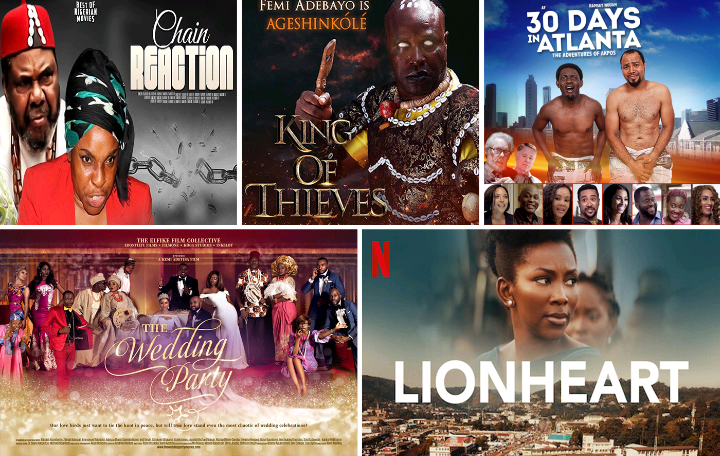Without doubt, Nigeria’s film industry has its roots in many centuries of rich culture. Nigeria’s Nollywood, which is the second largest film industry in the world today, was truly not a product of colonial occupation. The oral traditions, storytelling, festivals, masquerade performances, and the eventual ‘traveling theaters’ of pre- and post-colonial Nigeria laid the foundation of Nollywood. The term ‘Nollywood’ came much later, a coinage that emerged in the early 1990s.
The Nigerian Film Industry: How Nollywood was Birthed
Christian stage plays, along with British cinema films and television content of the colonial era, became a model for the evolution of the Nigerian film industry. But there was clearly a yearning to create our own stories, our own local content. And not merely focusing on entertainment or learning experiences entirely sourced from the Western world.
In the 1970s and 1980s, celluloid films were quite prominent. In the earlier years, some foreign investors, as well as the Nigerian government, were willing to fund such film projects. It brought pioneer movie makers and directors, the likes of Ola Balogun and Hubert Ogunde into the limelight. Much of their film content were based on common themes – from ancient folklore to political commentaries; and they operated on a small scale. In essence, they had limited resources on their own. Film production costs have always been expensive. There was also the headache of poor coverage – there were inadequate distribution channels, which affected how many consumers had access to these films.
The problem of poor funding of movies, and limited distribution networks, persisted into the early 1990s. It took the determination and some sort of ingenuity of certain traders and movie producers of Igbo origin to change the trend. This began in 1992 when Kenneth Nnebue, a trader based in Lagos, decided to deal with a dilemma. He found himself in possession of an excess number of unused videotapes; and would rather monetize them somehow. It was foolhardy to simply throw them away.
So he teamed up with at least two other movie professionals, to produce the first-ever Nigerian movie on videotape called ‘Living in Bondage’. Their efforts to promote and market the film eventually paid off – as they were able to sell half a million copies. At that time, it was a huge feat indeed. Thus began the gradual but sure journey into the actual modernization of the Nigerian film industry. The release of ‘Living in Bondage’ laid the foundation for the Nollywood industry of today. And for some years thereafter, the trend continued. In spite of having to use their own limited funds, a number of Igbo marketers, producers and directors across Lagos and Onitsha collaborated, and pushed on.
They recruited actors and actresses, used available movie sets, and struggled against all odds to churn out movies on videotapes. Distribution channels only improved slightly; and the video quality of these movies were often below standard. The themes of these movies were also not much diversified (still because of poor funding). But millions of eager Nigerian movie fans were all too pleased to patronize them, in spite of the obvious flaws of Nollywood content. And their revenues began to soar as the years went by.
When Compact Disks came into existence, these marketers and movie producers quickly migrated their film content to the new media. They suffered many cases of video piracy along the way (which is still a problem), a challenge that seriously reduced their earnings. However, the combined determination and passion of Nollywood professionals and actors/actresses to continue to entertain their countrymen both home and abroad was phenomenal. The industry has now grown in complexity and million-digit earnings to the point that big-time investors (including leading banks in Nigeria) are now willing to fund Nollywood projects. The extraordinary breakthrough came with the advent of movies produced for cinema houses. There has been no turning back ever since.
The National and Global Impact of Nollywood
For all its challenges since inception, Nollywood today has an impressive record to show. The Nigerian film industry is the second largest (and most prolific) film industry worldwide (after India’s Bollywood). Quality and complexity of story lines; as well as the setting up and funding of movie sets, may still be major problems.
Nevertheless, Nollywood produces well over 50 full-length feature films every week. The industry has well over a million direct and indirect employees; so it is undoubtedly one of the largest employers of labour in Nigeria. Nollywood contributes over 600 million US Dollars each year to Nigeria’s economy.
Yet again, some of the most talented actors and actresses have emerged from Nollywood, to the point of being Nigeria’s global ambassadors of culture. Nollywood and its talented thespians have showcased Nigeria’s rich cultures, traditions and languages to Africa and the world. A good number of Nollywood movies have won international awards.
Famous actress and movie producer, Genevieve Nnaji’s movie ‘Lionheart’ went so far as to be acquired by big online streaming platform Netflix. ‘Lionheart’ became the first Nollywood project to be acquired as a Netflix Original film. And Funke Akindele’s films ‘Battle on Bukka Street’ and ‘A Tribe Called Judah’ (amongst others) have broken unprecedented box office records, raking in several millions.
Conclusion
The regional and global influence of Nollywood in terms of cultural exchange and exposure, as well as earnings, is quite huge. Nollywood has given Nigeria the chance to tell its own authentic stories. It is an industry whose influence and coverage across Africa and worldwide can no longer be ignored.







